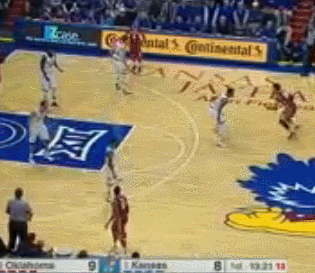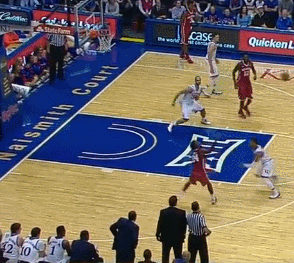They didn't spend the entire game guarding each other but there were more than a few 1-on-1 match-ups between the two players on Monday and Hield clearly got the better of Selden:
Hield: 46 points, 8 rebounds, 7 assists on 5 turnovers on 23 shots (8-15 from 3, 12-14 from the FT line)
Selden: 21 points, 5 rebounds, 2 assists on 0 turnovers on 17 shots (3-7 from 3, 0-1 from the FT line)
Selden (6'5 230 with a 6'10 wingspan) is much bigger than Hield (6'4 215 with a 6'8 wingspan) and he had trouble staying in front of the smaller and faster OU guard on the perimeter. He picked up two cheap fouls in the first half trying to guard Hield and ended up spending a lot of time on the bench in foul trouble:
That was a theme for Selden all game and it's a real concern when it comes to projecting him as a 3-and-D player at the next level. Can he stay in front of quicker players and be able to slide between multiple positions on defense? Here's Dinjiyl Walker (6'1 205) getting around Selden pretty easily:
The Kansas wings didn't have much of an answer for Hield, whether it was Selden or Sviatoslav Mykhailiuk (6'8 195), a sophomore whom DraftExpress projects as a first-rounder but who struggles to get playing time on a stacked Kansas team because of his struggles on defense:
Hield is an elite shooter - he's the rare guy who takes 3's at a ton of volume (7.2 a game) without sacrificing efficiency (50.0% as a senior). It's not like he's just spotting up off the ball either. He can create off the dribble and he can hoist shots with guys draped all over him. You can't give him any room at the 3-point line or he will murder you:
Where he really seems to have improved as a senior is the rest of his game. He's shooting more efficiently from 2-point range (50.4% as a senior vs. 46.9% as a junior) and he's more comfortable using the threat of his shot to drive into the lane and finishing in traffic.
Hield is looking to pass more and he has increased his number of assists (2.2) but his turnovers (2.4) have increased as well. He's clearly capable of moving the ball and finding the open man but you want to see his assist-to-turnover ratio improve in order to be comfortable projecting that part of his game to the next level. He can score whenever he wants at the NCAA level - if he's going to take OU to a Final 4, it's because he's making everyone else better with the ball in his hands.
The more he can make plays like this, the higher his ceiling in the NBA will be:
The Kansas player who had the most success on Hield was their PG Frank Mason (5'11 185) who used his quickness to press up on Hield when he had the ball in his hands and deny the ball and force him to catch it out to 25+ feet when he was off the ball. Hield tried to take Mason into the post a few times but he clearly wasn't as comfortable scoring with his back to the basket:
That's important because more and more NBA teams are playing 2-PG line-ups which means a SG like Hield has to be able to use his size to his advantage on offense. He wasn't able to get around Mason on the perimeter but he could still make tough shots over the top of him:
Using his size and high release point is the best part of Selden's offensive game. He's bigger than most NCAA wings and he can pull-up and shoot over the top of them:
Selden has made a huge jump as an outside shooter this season (54.2% on 5.1 3PA as a junior vs. 36.5% on 3.5 3PA as a sophomore) and that has opened up the rest of his game. Defenders can no longer give him any breathing room on the perimeter:
He's not a great 1-on-1 shot-creator off the bounce so the threat of his 3-point shot is huge for him since it allows him to attack close-outs. There's probably a reason that Kansas doesn't let him shoot off the drive too much and asks him mostly to be a secondary creator:
Selden has the size to attack Hield in the post but he's just not all that comfortable in a role as a primary creator.
It was hard to tell how good Hield was on defense in this game because Kansas didn't attack him 1-on-1 too much, preferring to move the ball and play inside-out with their big men.
When you are evaluating perimeter players for the next level in terms of their ability to play 1-on-1, you want to answer two questions on both sides of the ball:
1) Can they score over smaller defenders?
2) Can they get around bigger defenders?
1) Can they stay in front of smaller offensive players?
2) Can they hold up against bigger offensive players?
What we learned from this one is that Hield can get around slower defenders and score pretty easily while Selden has trouble staying in front of smaller offensive players. I have some questions about Hield's ability to score over smaller defenders while I don't see Selden as much of a shot-creator at all.
That leaves a few questions when it comes to projecting them to the NBA:
Hield is going to be a pure SG who makes his living as a shooter and a shot-creator. If he's going to be a starter at the next level, he has to be able to punish smaller guards because they are going to go at him on defense. The big question is how is he going to fare on defense if he's being attacked by NBA-caliber guards because he's not going to be hidden on defense like he is at OU.
Selden is going to more of a pure 3-and-D wing which makes his questionable lateral mobility very problematic. What I want to see is how he will fare against bigger 6'8+ combo forwards because he has the size and broad shoulders to potentially hold his own defensively at the SF position at the next level. Either way, though, if he can't guard 6'4-6'5 guys like Hield, he's going to have trouble sticking at the next level because 3-and-D players have to be versatile defensively. Hield can probably only guard one position too (SG) but he's good enough on offense to where that might not matter.












No comments:
Post a Comment